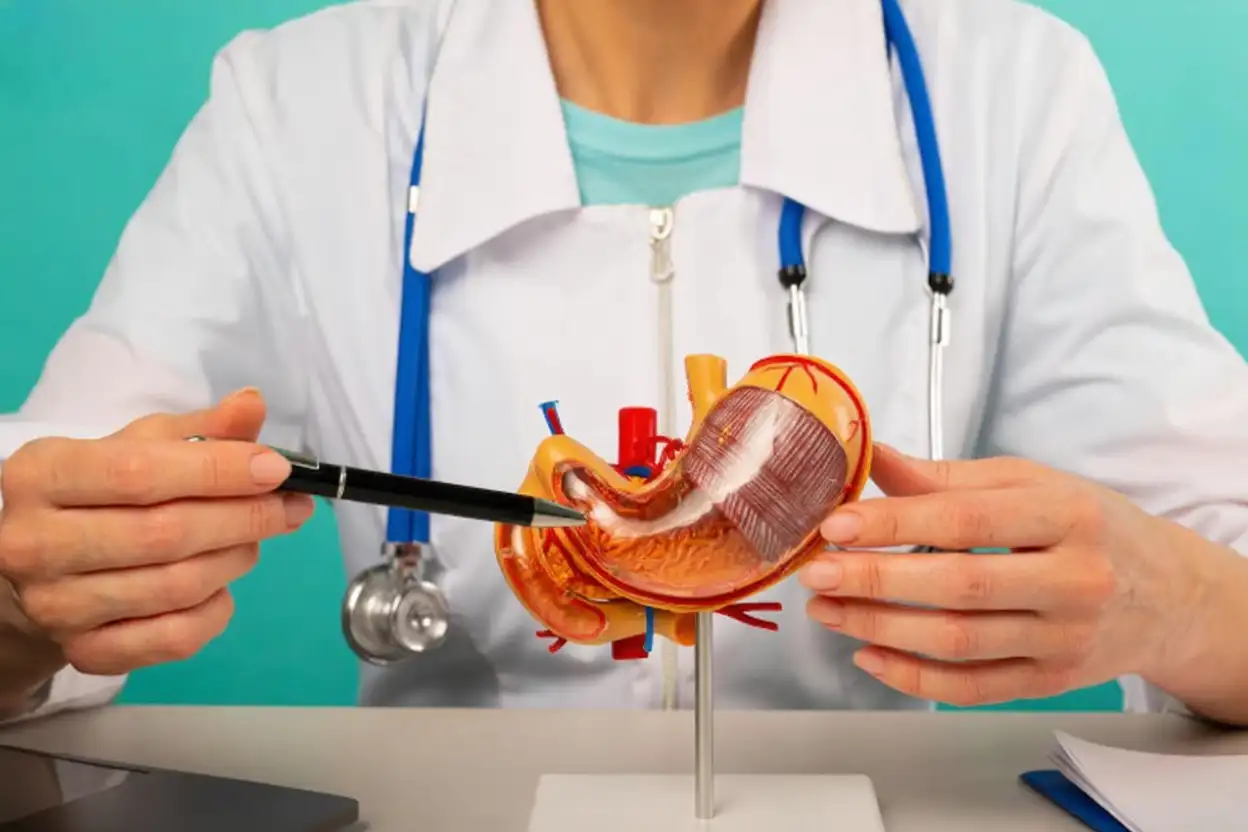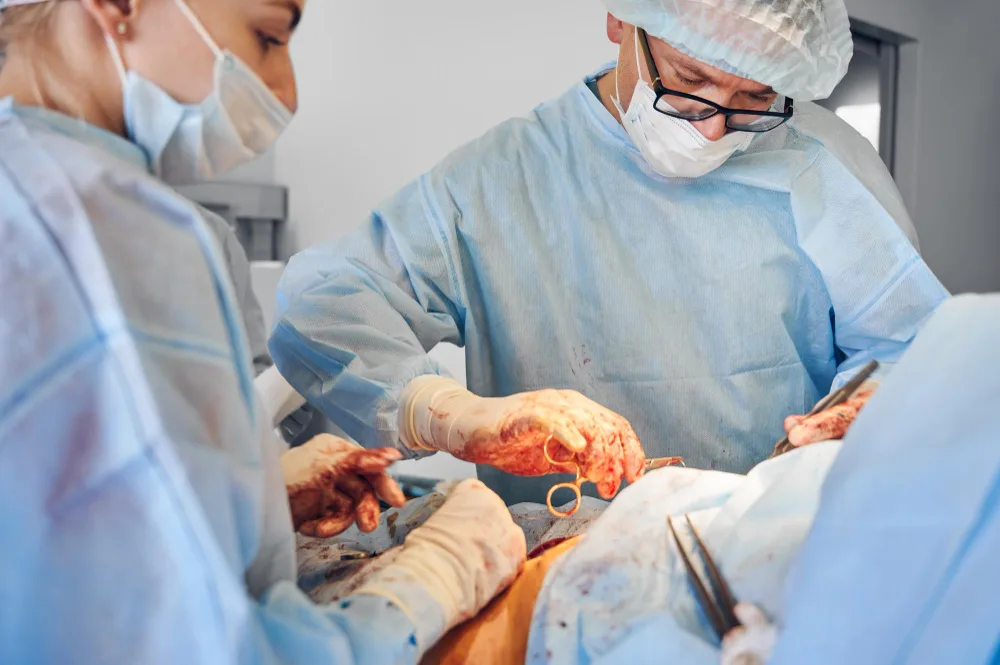Safe and Effective Gastroenterology Surgery
Expert gastroenterology surgery for digestive disorders, including liver, pancreas, stomach, and intestinal conditions. Advanced, minimally invasive treatments with personalized care for faster recovery.

Gastroenterology Surgery focuses on treating diseases of the digestive system through advanced surgical methods. It involves operations on organs such as the esophagus, stomach, intestines, liver, pancreas, and gallbladder. These procedures are crucial when medical or endoscopic treatments alone aren’t sufficient to restore normal digestive function.
At VS Hospitals, Chennai, the Department of Gastroenterology Surgery offers comprehensive care for patients dealing with complex gastrointestinal conditions. The team consists of highly skilled surgeons, gastroenterologists, and anesthetists who combine advanced surgical technology with compassionate care. VS Hospitals is renowned for its success in performing minimally invasive, laparoscopic, and robotic surgeries that ensure faster recovery, reduced pain, and minimal scarring.
Whether it’s a simple gallbladder removal or complex pancreatic surgery, patients at VS Hospitals receive personalized care plans designed to improve digestive health and long-term quality of life.

Early Detection Saves Lives
Early detection and treatment are crucial for improving the chances of survival. If you notice any concerning symptoms, consult a healthcare provider immediately.
Signs and Symptoms
Severe Abdominal Pain
Continuous or sharp pain could signal gallstones, hernia, or bowel obstruction.
Persistent Indigestion
Unresolved acid reflux or bloating may indicate structural issues requiring surgery.
Difficulty Swallowing
Could be a sign of esophageal stricture or tumors.
Chronic Nausea and Vomiting
Suggests intestinal obstruction or gastrointestinal motility disorders.
Unexplained Weight Loss
Sudden weight loss may point to gastrointestinal cancers or malabsorption issues.
Changes in Bowel Habits
Long-term constipation or diarrhea can indicate colon or rectal disorders.
Jaundice
Yellowing of the skin and eyes might be caused by liver, bile duct, or pancreatic conditions.
Rectal Bleeding or Blood in Stool
Often associated with polyps, ulcers, or colorectal cancer.
Abdominal Swelling or Lump
Could be due to hernia or tumor growth in the digestive tract.
Blood in Urine
Hematuria - pink, red, or dark urine, the most common symptom
Frequent Urination
Feeling the need to urinate frequently, even when bladder is not full
Painful Urination
Experiencing pain or burning sensation while urinating
Back or Pelvic Pain
Pain that occurs as the cancer grows and spreads
Unexplained Weight Loss
Significant weight loss not related to diet or exercise
Fatigue
Feeling unusually tired or weak without a clear cause
At VS Hospitals, each symptom is carefully evaluated using advanced diagnostic tools before suggesting surgical options. Early surgical intervention often leads to better outcomes and improved quality of life.
Meet Our Expert Gastroenterology Surgery
Risk Factors
Smoking
Smoking is one of the leading causes of bladder cancer. Chemicals in tobacco smoke can damage the lining of the bladder, increasing the risk.

Gender
Men are at a higher risk of developing bladder cancer than women.

Chronic Bladder Infections or Inflammation
Conditions such as bladder infections and long-term bladder inflammation can increase the risk.

Exposure to Chemicals
Prolonged exposure to certain chemicals, especially those used in the dye industry, rubber production, and chemical manufacturing, increases the risk.

Unhealthy Diet
High-fat and low-fiber diets increase the risk of gallstones, obesity, and colon cancer.

Obesity
Excess body weight contributes to acid reflux, gallbladder disease, and fatty liver.

Smoking and Alcohol
Both cause inflammation and increase the risk of stomach and pancreatic cancers.

Family History
Genetic predisposition can make one more prone to colorectal and liver diseases.

Chronic Digestive Disorders
Long-term ulcers, inflammatory bowel disease (IBD), or GERD can progress to surgical stages.

Infections
Viral hepatitis or H. pylori infections can damage the liver or stomach lining.

Sedentary Lifestyle
Lack of activity slows digestion and worsens metabolic disorders.

Uncontrolled Diabetes
Leads to delayed gastric emptying, gallbladder disease, and liver damage.

Advanced Cancer Treatment Options
Diet and Nutrition
Prevention
Diagnosis
Key Services
Key Facilities
Proper nutrition is essential for a healthy digestive system, especially before and after gastroenterology surgery. The clinical nutritionists at VS Hospitals work closely with surgeons and gastroenterologists to design personalized diets.
- High-fiber foods: Fruits, vegetables, and whole grains aid bowel movement and reduce constipation.
- Lean proteins: Chicken, fish, tofu, and lentils promote healing and tissue repair.
- Probiotic-rich foods: Yogurt, kefir, and fermented foods restore healthy gut bacteria.
- Hydration: Drinking adequate water helps regulate digestion and prevents dehydration after surgery.
- Avoid processed foods: Fried or spicy dishes trigger acid reflux and slow recovery.
- Small, frequent meals: Helps prevent bloating and discomfort after abdominal surgery.
- Low-fat diet: Reduces strain on the gallbladder and pancreas.
- Limit caffeine and alcohol: Both irritate the stomach lining and worsen reflux.
Patients at VS Hospitals receive ongoing dietary guidance to optimize recovery and support long-term gastrointestinal wellness.
Many gastrointestinal diseases can be prevented through healthy habits and regular check-ups. The VS Hospitals Gastroenterology Team promotes awareness and preventive health education.
- Maintain a balanced diet: Focus on natural, unprocessed foods with high fiber content.
- Avoid smoking and alcohol: These habits significantly increase the risk of ulcers, reflux, and liver damage.
- Exercise regularly: Improves metabolism, prevents obesity, and supports bowel health.
- Manage stress: Practices like yoga, meditation, and breathing techniques calm the digestive system.
- Stay hydrated: Proper water intake helps flush toxins and aids digestion.
- Follow food safety practices: Avoid contaminated food or water to prevent infections.
- Routine screenings: Colonoscopies and liver function tests help detect early abnormalities.
- Adhere to medications: Take prescribed medicines as directed to control acidity or chronic gut conditions.
At VS Hospitals, patients are educated on lifestyle modifications that enhance gastrointestinal function and overall health.
Accurate diagnosis is essential before recommending any gastrointestinal surgery. VS Hospitals uses world-class diagnostic facilities to pinpoint the exact cause and plan the most effective surgical approach.
Advanced Diagnostic Tools Include:
- Endoscopy and Colonoscopy: Direct visualization of the digestive tract to detect ulcers, polyps, or cancer.
- Ultrasound and CT Scans: Imaging techniques to assess gallbladder, pancreas, liver, and intestines.
- MRI and MRCP (Magnetic Resonance Cholangiopancreatography): For detailed imaging of bile ducts and pancreas.
- Liver Function Tests: Detects liver inflammation, cirrhosis, or bile duct obstruction.
- Barium Studies: X-rays that track how food moves through the digestive tract.
- Biopsy: Tissue samples collected during endoscopy or surgery to detect cancer or infection.
- ERCP (Endoscopic Retrograde Cholangiopancreatography): Combines endoscopy and X-ray to examine bile and pancreatic ducts.
- Capsule Endoscopy: A swallowable camera helps identify small intestine issues.
Each diagnosis at VS Hospitals is discussed with a multidisciplinary team that includes surgeons, radiologists, and pathologists to ensure complete accuracy and personalized treatment planning.
The Gastroenterology Surgery Department at VS Hospitals offers a wide range of surgical treatments using minimally invasive, laparoscopic, and robotic techniques to ensure precision and faster recovery.
Comprehensive Surgical Services Include:
- Laparoscopic Gallbladder Removal (Cholecystectomy): Safely removes gallstones and inflamed gallbladders with tiny incisions.
- Hernia Repair Surgery: Advanced mesh techniques for inguinal, umbilical, and incisional hernias.
- Appendix Surgery (Appendectomy): Quick, minimally invasive removal of infected appendices.
- Liver Surgery: Includes resection of liver tumors, cysts, and abscesses with high precision.
- Pancreatic Surgery: Management of chronic pancreatitis, cysts, and pancreatic cancer using advanced laparoscopic methods.
- Bariatric (Weight Loss) Surgery: Safe and effective surgical options for obesity management.
- Colorectal Surgery: Treatment for colon polyps, cancer, and diverticulitis through minimally invasive techniques.
- Anti-Reflux Surgery (Fundoplication): Corrects chronic acid reflux or GERD.
- Splenectomy: Removal of diseased spleen due to trauma or blood disorders.
- Bile Duct Surgery: Resolves bile duct blockages caused by stones or strictures.
- Stomach and Small Intestine Surgery: Addresses ulcers, obstructions, and tumors.
- Piles, Fissure & Fistula Surgery: Performed using laser and minimally invasive methods for faster recovery.
VS Hospitals’ Gastroenterology Surgery Unit ensures patient safety through preoperative evaluations, anesthesia monitoring, and post-surgical care with minimal pain and complications.
VS Hospitals, Chennai, is equipped with cutting-edge infrastructure that ensures high success rates in gastroenterological surgeries. Its facilities meet international standards for surgical safety, precision, and patient recovery.
State-of-the-Art Facilities Include:
- Advanced Modular Operation Theatres: Equipped with HEPA filters, surgical microscopes, and high-definition imaging systems.
- Laparoscopic and Robotic Surgery Units: Enables precise procedures with minimal blood loss and faster recovery times.
- Dedicated Endoscopy and Colonoscopy Suites: For real-time visualization and immediate intervention.
- Comprehensive Liver and Pancreas Unit: Specializes in treating complex hepatobiliary and pancreatic conditions.
- Modern Intensive Care Units (ICU): Monitored by experienced critical care specialists for post-operative recovery.
- Day-Care Surgery Ward: Allows short-stay patients to return home the same day.
- 24/7 Emergency and Trauma Support: Rapid response for acute gastrointestinal bleeding or perforations.
- Integrated Diagnostic Imaging Department: Houses CT, MRI, Ultrasound, and Digital X-rays for quick assessments.
- In-House Laboratory and Pathology Unit: Provides immediate test results for pre- and post-surgical management.
- Rehabilitation and Diet Counseling: Personalized programs for smooth recovery and digestive health maintenance.
VS Hospitals also emphasizes patient comfort through digital health records, teleconsultations, and round-the-clock nursing care, ensuring continuity of care even after discharge.
Top Medical Facilities at Our Multispeciality Hospital – Here’s What Makes Us Different!
Ready to Begin Your Gastroenterology Surgery Care Journey?
Learn More About Gastroenterology Surgery
Frequently Asked Questions
VS Hospitals stands out for its advanced surgical facilities, expert gastroenterology surgeons, and use of cutting-edge laparoscopic and robotic techniques. The hospital ensures precise, safe, and effective surgeries with minimal recovery time and high success rates, supported by personalized post-operative care.
Minimally invasive surgeries at VS Hospitals involve smaller incisions, less pain, and shorter hospital stays. Patients recover faster, experience fewer complications, and return to normal life sooner. These advanced surgical techniques ensure both aesthetic and clinical advantages.
After surgery, patients at VS Hospitals receive continuous monitoring, dietary counseling, and physiotherapy support. The hospital’s post-operative care team ensures pain management, infection prevention, and gradual return to regular digestive function under expert supervision.
